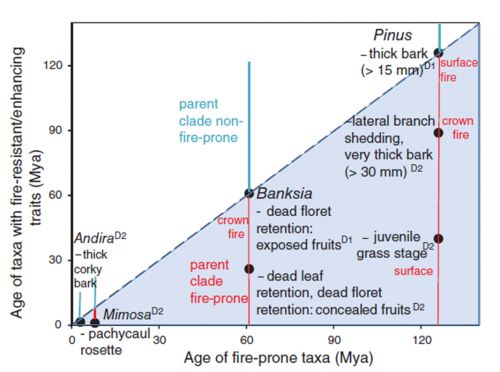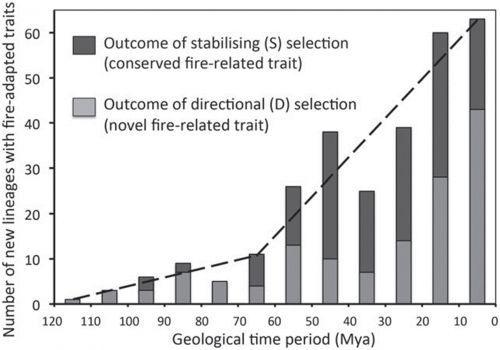南湖新闻网讯(通讯员 滕明君)11月29日,《生物学综述》(Biological Reviews)在线发表了我校森林生态研究团队与澳大利亚科廷大学共同完成的“火诱导下种子植物生殖系统进化研究进展(Evolutionary history of fire-stimulated resprouting, flowering, seed release and germination)”,系统地阐明了林火在植物生殖系统进化过程中所起的重要作用。
火对植物的进化影响深远,可追溯到一亿年前(图1),在易燃环境中,许多植物在火的诱导下,形成了具有隔热分生组织、火后萌发、火刺激的开花、种子的释放和萌发等生物特性。课题组通过对20个科的被子植物和两个科的裸子植物的286份记录和50个系统发育特征的系统分析,将植物的开花、种子的释放和萌发划分为三类:不需要火、弱度适应火或强度适应火。

图1
图1. Age of fire-prone taxa/clades relative to component taxa/clades with fire-resistant or fire-enhancing traits. The broken diagonal line corresponds to the time where the onset of fire-proneness and fire-adapted traits coincide (or at least they lie on the same internode and current methods do not allow any age differences to be distinguished). The taxa and their associated traits are stated near their coordinates (black spots), i.e. the age of the parent clade on the x axis and the time the targeted trait is estimated to have arisen in the clade on the y axis (typically the former is older than the latter, i.e. the trait arose some time after the clade became fire-prone). Duration of the fire-prone parent clade is shown separately from the non-fire-prone parent clade (the latter is open-ended as its duration is unknown or continues indefinitely). D1 = primary directional selection; D2 = secondary directional selection; S = stabilised selection. The shaded lower triangular area is the region in which the component taxa/clades are fire-prone. Mya, million years ago.
课题组明晰了植物通过生殖系统和种子萌发进化适应林火的过程。植物生殖系统对林火适应在白垩纪(120至65百万年)演化缓慢,新生代中期(65至20百万年)演化加速,五百万年前达到高峰(图2),这归因于生长条件的波动和不适于非萌芽的稀树草原的增加。在新生代,随着世界气温和氧气水平的降低,火灾活动减少,在世界范围内,植物的火适应性状的演化,在40至30百万年处于低谷。在中白垩纪,厚树皮的系统发育出现在现存的松科植物中。林火刺激硬种子的萌发起源于1亿年前,主要起源于易燃植物,如烟熏刺激的帚灯草科和苞穗草科种子萌发,但在一些易燃植物的分支中,都缺乏与火相关的生物性状。课题组通过分析Protea属(起源于非洲)和Hakea属(起源于澳大利亚)植物过去两千万年来的进化历程,发现还有一些物种通过生殖系统进化和种子萌发进化发生频繁转换以适应林火。

图2
图2. Contribution of four novel and conserved fire-related trait-types to total (net) speciation at the lineage level for 10-million-year (My) intervals over the last 120 My. The outcomes of primary (D1) and secondary (D2) selection have been combined. The broken lines are the trends for the 12060 Mya (Upper Cretaceous) and 600 Mya (Cenozoic) periods.
除松科植物外,大部分与林火有关的生物性状的起源和进化都发生在南半球, 这与南半球历史上的气候条件有关。在世界范围内,火灾对植物繁殖性状的演化产生了深远的影响,并为许多与火灾无关性状的后续进化奠定了基础。该项研究成果拓宽了人们对植物生殖系统系统发育的认知,为研究植物在全球气候变化下的生物学特性的进化提供重要的理论参考。
本研究得到了中央高校基本科研业务费专项资金的支持,澳大利亚科廷大学教授Lamont为论文第一作者,博士晏召贵为论文通讯作者。
原文链接:https://onlinelibrary.wiley.com/doi/full/10.1111/brv.12483
审核人:晏召贵 王鹏程